The Tin Drum is a powerful, haunting and sometimes disturbing movie adaptation of Günther Grass‘s extraordinary novel; source materials do not come any better than Germany’s finest living author, though it must be a cause of some sadness to Grass that the movie could not be shot in his native Danzig, since the Soviet and Polish authorities had banned the novel and gave filming short shrift. But then Danzig has been a political football many times over the years. Still, the atmosphere of pre-war Poland is captured magnificently, and the seaside tableau is painted like a Jack Vettriano.
While lacking the surrealistic qualities of, say, Eraserhead, few movies can ever have portrayed so effectively a nauseatingly stylised, off-kilter adult world through the eyes of a deformed and, arguably, disturbed child from his birth through to his own adulthood, many of the strange events that occurred inbetween, and many of the characters typical of the time.
The Tin Drum is an inky black comedy of life from the first to the second world wars, almost a flipside to the decadent devil-may-care Cabaret. The world here is portrayed as sordid and unpleasant, cowardly yet self-punishing; even the sex is strangely mechanical, unerotic and joyless. Some might find the use of dwarves distasteful, and many more would be put off eels and raw fish for life as a result of seeing this movie, but there is also something strangely hypnotic about this allegorical chronicle.
The main protagonist (though at times he seems more of an anti-hero or observer) is Oskar Matzerath, who at the age of 3 decides he does not want to grow up and to that end effects an injury that ensures he never grows any taller. His tin drum is symbolic of his desire to retain childhood in the face of a bizarre family life, his rebellion through the ability to shatter glass with one scream, along with small acts of subversion. Oskar’s sophistication from birth and sociopathic attitude with tiny moments of remorse remind me in no small measure of Stewie Griffin in Family Guy – or maybe the cartoon character subconsciously carries the persona of Oskar?
Indeed part of the moral distaste in viewing the movie is from watching Bennent’s character engaged in very adult pursuits with women much his senior. From Wikipedia:
The film features scenes in which Bennent, then 11 years of age and playing a stunted 16-year-old, licks effervescing sherbet powder from the navel of a 16-year-old girl, played by Katharina Thalbach. Thalbach was 24 years old at the time. Subsequently, Bennent appears to have oral sex and then intercourse with her.
In 1980, the film version of The Tin Drum was first cut, and then banned as child pornography by the Ontario Censor Board in Canada. Similarly, on June 25, 1997, following a ruling made by State District Court Judge Richard Freeman, who had reportedly only viewed a single isolated scene of the film, The Tin Drum was banned from Oklahoma County, Oklahoma, citing the state’s obscenity laws for portraying underage sexuality. All copies in Oklahoma City were likewise confiscated and at least one person who had rented the film on video tape was threatened with prosecution. Michael Camfield, leader of a local chapter of the American Civil Liberties Union, filed a lawsuit against the police department on July 4, 1997, alleging that the tape had been illegally confiscated and his rights infringed.
This led to a high-profile series of hearings on the film’s merits as a whole versus the controversial scenes, and the role of the judge as censor. The film emerged vindicated and most copies were returned within a few months. By 2001, all the cases had been settled and the film is legally available in Oklahoma County. This incident was covered in the documentary film Banned in Oklahoma, which is included in the 2004 Criterion Collection DVD release of The Tin Drum.
In a sense, the objections prove Grass’s point about the nature of adult life, giving him the last laugh. The full plot courtesy of Wikipedia:
The film begins in 1899, with the grandfather of Oskar Matzerath, the main character, being pursued by the police through rural Kashubia. Hiding underneath the skirts of a young woman named Anna Bronski, with whom he later marries and fathers a daughter – Oskar’s mother – he evades the authorities until he apparently drowns trying to escape them. As time goes by, Anna’s daughter Agnes develops an incestuous affair with her cousin Jan Bronski, a worker in the Polish Post Office, until she is introduced to the charismatic Alfred Matzerath while serving as a nurse during World War I. The two men become firm friends, albeit love rivals, and later Agnes gives birth to a son, Oskar. Oskar has an adult mentality since birth and upon hearing from Alfred that he will inherit his grocery shop when he is an adult, he decides to stop growing by the age of three.
On Oskar’s third birthday he is given a tin drum, something that will remain with him for the rest of the film. Oskar throws himself down the cellar stairs, strangely injuring himself, and from that day on he does not grow any older. It is discovered that Oskar has the ability to shatter glass with his voice, which he uses to cause disruption whenever he is upset. Oskar uses his drum for similar purposes, such as disrupting a Nazi rally. During a visit to the circus, Oskar is introduced to Bebra, a performing dwarf whom Oskar can relate to.
When the four are on an outing to the beach, they see an eel-picker at work collecting eels from a washed-up horse’s head, a sight that makes Agnes repeatedly vomit. Alfred buys some of the eels and a confrontation begins when he insists that she eat them, ultimately leading to Agnes developing a strange addiction to raw fish, from which she gets food poisoning and eventually dies. At his mother’s funeral, Oskar witnesses an antisemitic assault on Sigismund Markus, the Jewish toymaker who supplies him with drums; Nazism is on the rise, and the Jewish and Polish residents of Danzig are under increasing pressure from the German community. Markus commits suicide during Kristallnacht, when his shop is attacked by SA men, and synagogues are burned down.
On the 1st of September 1939, Oskar, while looking for the Polish caretaker Kobyella, who can repair his drum, unwittingly leads Jan into the Polish Post Office, which is about to join an armed standoff against the SS by the Polish workers. During the battle, Kobyella is shot while fetching a new drum for Oskar, and Jan is wounded. They withdraw to the storeroom and play Skat until Kobyella eventually dies and the Germans capture the building. Oskar is taken home as Jan is arrested and eventually executed.
Despite the recent turbulence, Alfred’s shop resumes business normally and he employs the fifteen-year-old Maria as housekeeper. Oskar seduces Maria and impregnates her, later irritated at her to find out that she is having an affair with Alfred. Oskar also has a brief sexual relationship with Lina Greff, the wife of the local grocer and scoutmaster.
During World War II, Oskar comes across Bebra again, and he meets Roswitha, a new member of his troupe. Oskar decides to join Bebra’s team, using his glass-shattering voice as part of the act. Oskar and Roswitha begin a romantic affair which is cut short when she is killed by artillery fire during the Allied invasion of Normandy while on tour in France. After a lift back to Danzig with the team, Oskar bids farewell and returns home. Much of the city has been destroyed and the Russians are fast approaching. Oskar meets his now three-year-old son Kurt, to whom he gives a tin drum much like his own.
As the Russians finally enter the city, the family are hiding in the cellar when a group of Russian soldiers break in and gang-rape Lina. Alfred is killed by a Mongolian-Sovietic soldier after choking violently on his Nazi party pin-badge in an attempt to swallow it. During Alfred’s burial when the war is over, Oskar decides that he will now grow up and throws away his drum. As he does, Kurt throws a stone at his head and he is knocked unconscious, a catalyst that causes him to start growing again. Soon afterwards, all of the family apart from Anna Bronski are deported from the city, which is to be re-occupied only by Poles. As the train leaves, the film ends as it begins; with Anna Bronski sitting in her potato field, watching the train go by.
To further quote Sarah Boslaugh’s review of the same movie, stating my view very succinctly:
The Tin Drum is a big film loaded with symbols and multiple layers of meaning, and is really something you need to experience for yourself, with as few preconceptions as possible. The key to the film is the performance of Bennent, who was 12 at the time of the filming but looked much younger due to a physiological disorder that interfered with his growth. He gives the kind of performance that should have been showered with awards, but somehow got overlooked in the voting.
This is not perhaps a movie you could say you can enjoy, but it is without doubt one of the greatest adaptations of a novel, a film of weight and stature, one to provoke thought and feeling.

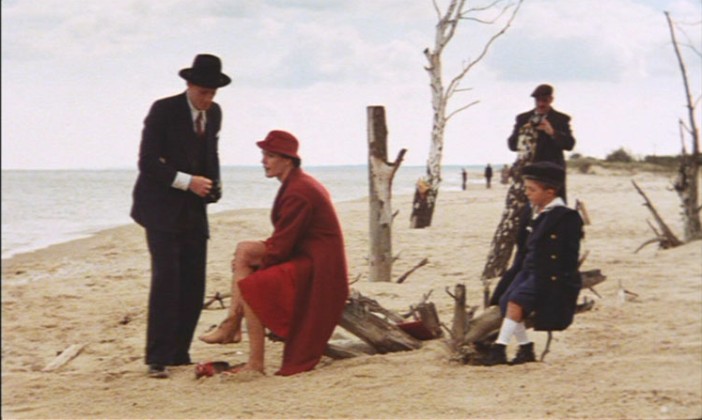
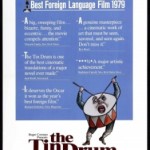
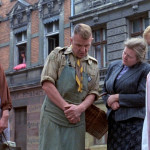

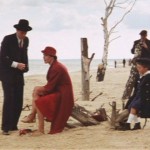
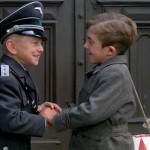

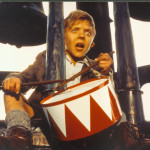


Terrific work! That is the kind of information that are meant to be shared
around the web. Disgrace on Google for not
positioning this submit upper! Come on over and seek
advice from my website . Thanks =)